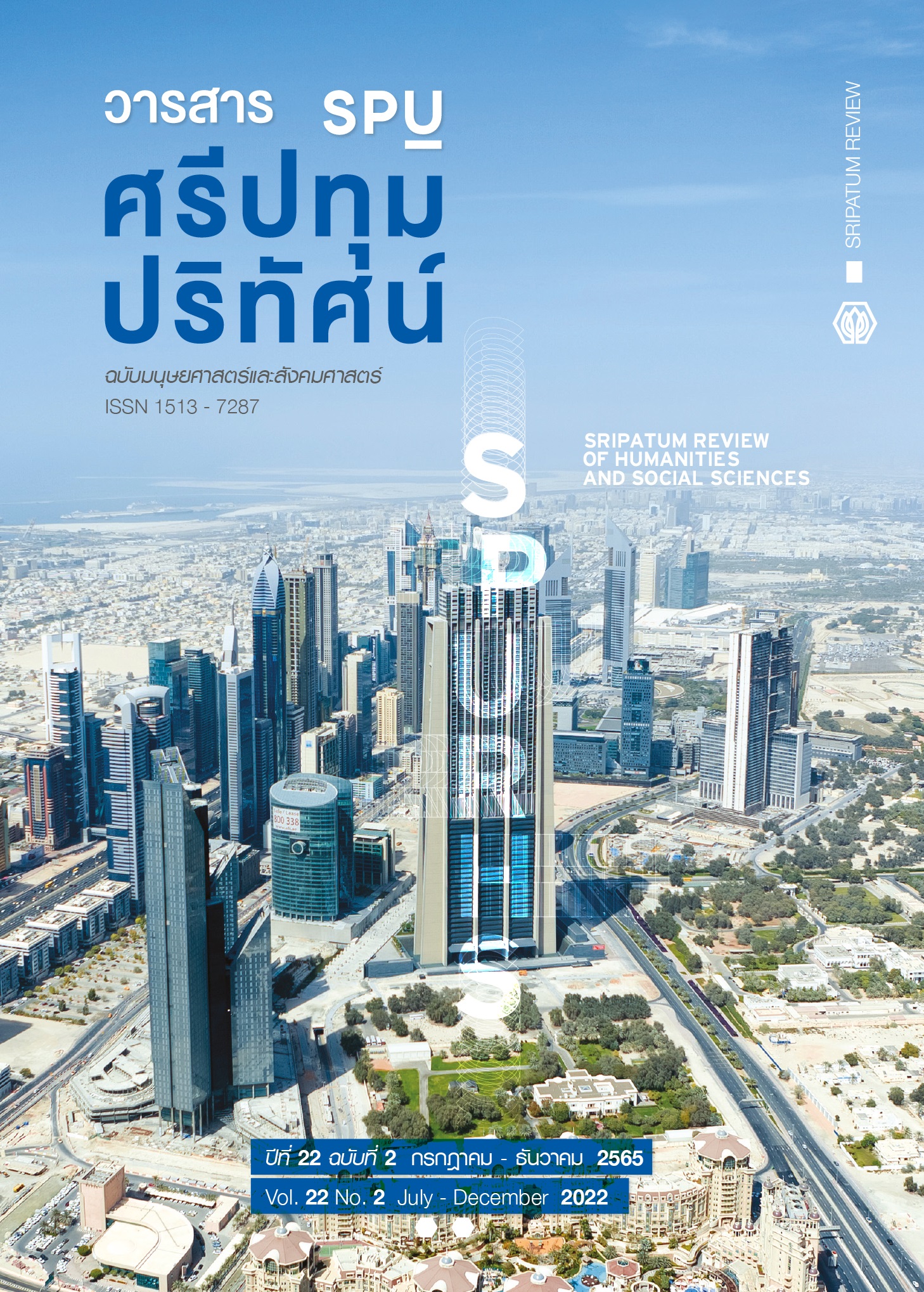การพัฒนาสมรรถนะของผู้ประเมินภายนอกในศตวรรษที่ 21 ที่สนับสนุนต่อประสิทธิภาพการประเมินด้านการอาชีวศึกษาในประเทศไทย (The Development of External Assessors’ Competencies in the 21st Century for Supporting Assessment Efficiencies in the Vocational Education System of Thailand)
Main Article Content
บทคัดย่อ
การศึกษาครั้งนี้ มีวัตถุประสงค์เพื่อค้นหาสมรรถนะของผู้ประเมินภายนอกในศตวรรษที่ 21
ที่สนับสนุนประสิทธิภาพการประเมินด้านการอาชีวศึกษาในประเทศไทย โดยใช้การสังเคราะห์สมรรถนะและตัวชี้วัดจากผู้เชี่ยวชาญที่เกี่ยวข้องกับด้านการอาชีวศึกษาจากการเลือกแบบเฉพาะเจาะจง ผ่านเทคนิคเดลฟาย จากนั้น นำข้อมูลที่ได้ทดสอบเพื่อค้นหาองค์ประกอบเชิงยืนยัน (CFA) โดยใช้โปรแกรมสำเร็จรูปทางคอมพิวเตอร์ กับกลุ่มตัวอย่างผู้ประเมินภายนอกด้านการอาชีวศึกษาจำนวน 272 คน ที่ได้จากการเก็บตัวอย่างแบบสะดวกด้วยแบบสอบถามออนไลน์ ผลการศึกษา พบว่า สมรรถนะที่สนับสนุนประสิทธิภาพการประเมิน
ในศตวรรษที่ 21 ควรประกอบด้วย 3 สมรรถนะหลัก คือ สมรรถนะที่ 1 ด้านความรู้ที่เกี่ยวข้องกับอาชีวศึกษา ประกอบด้วย 6 สมรรถนะย่อย ได้แก่ (1) บริบทของสถานศึกษา (2) หลักการประกันคุณภาพ (3)การออกแบบหลักสูตรและการจัดการเรียนการสอน (4) การบริหารจัดการสถานศึกษา (5) ทิศทางการศึกษาในปัจจุบัน (6) แนวโน้มและทิศทางของตลาดแรงงานในอนาคต 2) สมรรถนะที่ 2 ด้านทักษะ ประกอบด้วย 8 สมรรถนะย่อย ได้แก่ (1) การทำงานเป็นทีม (2) ความสามารถทางดิจิทัลเพื่อการประเมิน (3) การสื่อสารเพื่อการประเมิน (4) การเก็บรวบรวมข้อมูล (5) การวิเคราะห์ ตีความ และประเมินผล (6) การเขียนรายงาน (7) การให้ข้อเสนอแนะ และ (8) การแก้ไขปัญหาเฉพาะหน้า และ 3) สมรรถนะที่ 3 ด้านคุณลักษณะ ประกอบด้วย 2 สมรรถนะย่อย ได้แก่ (1) คุณธรรมจริยธรรมการประเมิน และ (2) ความเป็นมืออาชีพของผู้ประเมิน และเมื่อนำสมรรถนะหลักและตัวชี้วัดดังกล่าวไปทดสอบเชิงปริมาณกับกลุ่มตัวอย่างด้วยวิธี Second-Order CFA เพื่อวิเคราะห์ความตรงเชิงโครงสร้าง พบว่า ค่า 2 = 88.50 p value = 0.266 GFI = 0.96 , AGFI = 0.93, RMSEA = 0.018 และ RMR = 0.009 โดยมีนัยสำคัญทางสถิติที่ระดับ 0.05 และตัวชี้วัดแต่ละสมรรถนะมีค่าสัมประสิทธิ์ความเชื่อมั่นในการวัดอยู่ระหว่าง 0.32 - 0.90 ข้อค้นพบที่สำคัญจากการศึกษาครั้งนี้ชี้ให้เห็นว่า การประเมินด้านการอาชีวศึกษาควรมุ่งให้ความสำคัญกับสมรรถนะย่อยด้านความรู้เรื่องการบริหารจัดการสถานศึกษาอาชีวศึกษา สมรรถนะย่อยทักษะการสื่อสารและการให้ข้อเสนอแนะ รวมถึงการส่งเสริมจริยธรรม ซึ่งเป็นตัวชี้วัดสำคัญต่อประสิทธิภาพการประเมินของผู้ประเมินภายนอกด้านการอาชีวศึกษาในศตวรรษที่ 21 ควบคู่ไปกับการมุ่งเน้นสร้างความเป็นมืออาชีพของผู้ประเมินภายนอกจะช่วยสนับสนุนต่อประสิทธิภาพในการประเมินและนำไปสู่การยกระดับคุณภาพของการศึกษาด้านการอาชีวศึกษาของประเทศไทยมากยิ่งขึ้น
Article Details

อนุญาตภายใต้เงื่อนไข Creative Commons Attribution-NonCommercial-NoDerivatives 4.0 International License.
1. กองบรรณาธิการสงวนสิทธิ์ในการพิจารณาและตัดสินการตีพิมพ์บทความในวารสาร
2. บทความทุกเรื่องจะได้รับการตรวจสอบทางวิชาการโดยผู้ทรงคุณวุฒิ แต่ข้อความและเนื้อหาในบทความที่ตีพิมพ์เป็นความรับผิดชอบของผู้เขียนแต่เพียงผู้เดียว มิใช่ความคิดเห็นและความรับผิดชอบของมหาวิทยาลัยศรีปทุม
3.การคัดลอกอ้างอิงต้องดำเนินการตามการปฏิบัติในหมู่นักวิชาการโดยทั่วไป และสอดคล้องกับกฎหมายที่เกี่ยวข้อง
เอกสารอ้างอิง
Ahmadpoor, S., Jamshid, S., and Samani, E. (2018). The Impact of Environmental Design on
Employee Performance at PNPI Group. Global Business and Organizational Excellence, 37(2), 41-48.
AYQON. (2016). Proceedings of the 2016 ASEAN Young Quality Assurance Officers Network
Forum. [Online]. Retrieved December 10, 2019, from: http://www.ayqon.org/downloads /ayqon_proceedings2016.pdf
Ayub, N., and Islam, M. (2018). The Effects of Employee Engagement on Employee Performance in the Hotel Industry in Kelantan. Global Business and Management Research an International Journal, 10(3), 828-838.
Bangkok Business News. (2018). Ministerial Regulations for Educational Quality Assurance B.E.
[Online]. Retrieved November 2, 2019, from: https://www.bangkokbiznews.com /politics/793784 (in Thai)
Baroun, A. E. (2021) Meritocracy, Personality Traits and Recruitment: Some Insights from the Qatari Enterprising Community. Journal of Enterprising Communities: People and Places in the Global Economy, 16(3), 494-514.
Buchanan, H., and Ontario, K. (2014). Evaluator Competencies: The Canadian Experience. The Canadian Journal of Program Evaluation, 28(3), 29-47.
Donsanthia, P. (2017). Development of Vocational External Quality Competency Indicators and Evaluation Criteria for Assessors. Thesis of the Degree of Master of Research and Development on Human Potential Program. Bangkok: Srinakharinwirot University. (in Thai)
Karatepe, O. M. (2013). High-Performance Work Practices and Hotel Employee Performance:
The Mediation of Work Engagement. International Journal of Hospitality Management, 32, 132-140.
McClelland, D. C. (1973). Testing for Competence Rather Than for Intelligence. American
Psychologist, 28(1), 1-14.
Nurtanto, M., Fawaid, M., and Sofyan, H. (2020). Problem Based Learning (PBL) in Industry 4.0:
Improving Learning Quality through Character-Based Literacy Learning and Life Career
Skill (LL-LCS). International Journal of Physics: Conference Series, 1573(1), 012006. [Online]. Retrieved December 10, 2019, from: https://iopscience.iop.org/article /10.1088/1742-6596/1573/1/012006/pdf
Office of Nation Education Standards and Quality Assessment (Public Organization). (2019a).
Vocational Assessor Manual (Edit May 2019). [Online]. Retrieved January 23, 2021, from: http://www.onesqa.or.th/th/download/1164/ (in Thai)
Office of Nation Education Standards and Quality Assessment (Public Organization). (2019b).
Report of a Research Project to Develop a Model and Method for Developing the
Competency of External Assessors. [Online]. Retrieved October 15, 2019,
from: http://www.onesqa.or.th/th/contentlist-view/1212/2805/ (in Thai)
Office of the Commission 3, Secretariat of the Senate (2016). Plan for Urgent Reform of Resolving Problems Related to Internal Quality Assurance and External Quality Assessment. [Online]. Retrieved October 15, 2019, from: http://www.navedu.navy.mi.th/qedu /manual61/004_sta_report14mar59.pdf (in Thai)
Pahos, N., and Galanaki, E. (2019). Staffing Practices and Employee Performance: The Role of
Age. Evidence-Based HRM, 7(1), 93-112.
Park, G. (2021). Evaluating the Service Operating Efficiency and Its Determinants in Global Consulting Firms: A Meta frontier Analysis. Sustainability, 13(18), 1-18.
Payne, J. W. (1994). Thinking Aloud: Insights into Information Processing. Psychological Science, 5(5), 241-248.
Songsaeng, N. (2017). The Factor Analysis of Competencies of External Assessors in Basic Education Level Need to Conduct for External Quality Assessment in the Fourth Round (B.E. 2016-2020) of the Office for National Education Standards and Quality Assessment (Public Organization). Thesis of the Degree of Doctor of Philosophy of Research and Development on Human Potential Program. Bangkok: Srinakharinwirot University. (in Thai)
Stufflebeam, D. L. (1973). Evaluation as Enlightenment for Decision-Making. In Worthen, B. R. and Sanders, R. J. (Eds). Educational Evaluation: Theory and Practices. (pp. 41-73). Worthington, OH: Charles A Jones Publishing Company.
Sujiva, S., Na-Songhkla, J., and Panjamawat, T. (2018). Research to Develop Models and Methods for Developing External Evaluators Competencies. Journal of Research Methodology, 31(3), 257-279. (in Thai)
The Quality Assurance Agency for Higher Education (QAA). (2019). External Expertise. [Online]. Retrieved January 10, 2019, from: https://www.qaa.ac.uk//en/quality-code/advice-and-guidance/external-expertise.


